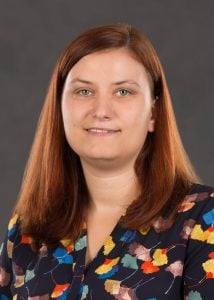Parkinson’s Disease & Genetics in the Hispanic Population
Today we continue our Interview with APDA Researchers series to bring you a closer look at some of the dedicated APDA-funded researchers who are working tirelessly to understand the mysteries of Parkinson’s disease (PD).
Our guest today is Dr. Karen Nuytemans, a Research Assistant Professor in the John P. Hussman Institute for Human Genomics and the Dr. John T. Macdonald Department of Human Genetics at the University of Miami Miller School of Medicine in Miami, FL. She researches the genetics of neurodegenerative brain disorders, specifically Parkinson’s disease, and related disorders. Her APDA-funded work is focused on the genetics of PD, specifically in Hispanic populations. Dr. Nuytemans’ work aligns with APDA’s increased efforts to expand the diversity in Parkinson’s disease research.
We asked Dr. Nuytemans about her research.
Q: What is the overarching goal of your research? What do you hope to find out?

A: My research aims to identify genetic variants (or variations) that contribute to development of PD. These genetic variants cause changes in the proteins they encode, leading to dysfunctional or missing proteins, which in turn affect the function of the nerve cells. If we can identify those genetic variants and understand how they change cell function, then we can use that information to design new treatments.
Much of the genetic research done in various disease states, including PD, has been focused on white, non-Hispanic populations – that is, those of European descent. This has led to a potential gap in our knowledge of other variants contributing to PD in non-European ethnic populations.
More recent Alzheimer disease genetic research that has focused on non-European populations, demonstrated that genetic variants can be very different between European, African and Amerindian backgrounds. Therefore, a subgoal of my research is to identify gene variants that contribute to disease in diverse populations. Given my location at the University of Miami, this research is currently focused on Hispanic populations.
It is also important to note that discovery of genetic variants of PD that are present in diverse populations will not only broaden our understanding of PD in those particular populations. It will also open new doors of understanding of disease mechanisms that could be applicable to PD in all populations.
Q: Could you describe how you perform your studies?
A: When we enroll patients in our genetic study, we obtain a lot of clinical information about their PD – including disease onset, symptoms, current medications, etc. We also obtain a blood sample to extract DNA and study the genetic material.
Currently, we are focused on two genes that have been implicated in contributing to PD risk in European populations – LRRK2 and GBA. We first test whether the patients with diverse backgrounds (mostly Hispanic) carry any of the known variants of these two genes – those variants originally identified in white, non-Hispanic patients. We then test whether the patients harbor any novel variants of these genes that have not yet been identified.
To identify those variants that might be unique to the Hispanic population, we aim to enroll multiple PD patients and controls from the same family. By testing members of the same family with and without PD, we can find variants that are shared just by the affected members and not by the unaffected family members.
Ultimately, we aim to identify novel disease variants not just in these two known genes, but across the entire genome.
Q: Can you tell us a little bit about what you have found out so far?
A: We initially screened about 80 Hispanic patients (about half identified as Cuban and half as Puerto Rican), for variants in LRRK2 and GBA. We identified about 10 patients with variants originally identified in white, non-Hispanic patients.
Excitingly, we also identified two novel variants in LRRK2 in three Hispanic patients. Their surrounding sequence showed that these might have been introduced by an African or Amerindian ancestor. Though we need to confirm these initial observations, they strongly suggest the existence of novel variants in known genes that are unique to understudied population groups.
Q: What fuels your passion for research?
A: Science has always felt like a puzzle to me. With each experiment, we gain a little bit more knowledge. It is like fitting a small puzzle piece into a huge puzzle, eventually hoping to reveal the whole picture. Studying brain diseases is particularly intriguing since there is still so much we don’t know about how the brain works, and particularly how genetics plays a role in these diseases.
I feel privileged to be in a situation where I can contribute to reducing the gap in knowledge of brain diseases in diverse populations, here in the US and worldwide.
Q: Can people be part of your research?
A: Of course. We are looking for any PD patient that identifies as Hispanic or African American, who would be willing to provide us with clinical information and a blood sample. (Given COVID-19 considerations, we have halted in-person blood draws for now until it is safe to resume).
For people interested in hearing more about the study, we can send a study brochure. Please contact the study at the John P. Hussman Institute for Human Genomics (HIHG) by emailing: hihginfo@med.miami.edu .
Tips and Takeaways
- Various genetic mutations increase the risk of developing Parkinson’s disease.
- Most of the studies of these genetic mutations have so far taken place in European populations, leaving many non-European populations under-studied.
- Dr. Nuytemans is researching genetic contributors to Parkinson’s disease in Hispanic populations which aims to broaden our knowledge of how PD develops.
- Read more about the exciting research that APDA funds.
- We are only able to fund this research because we receive donations from dedicated people like you. If you would like to support this critical work, please consider making a donation.
